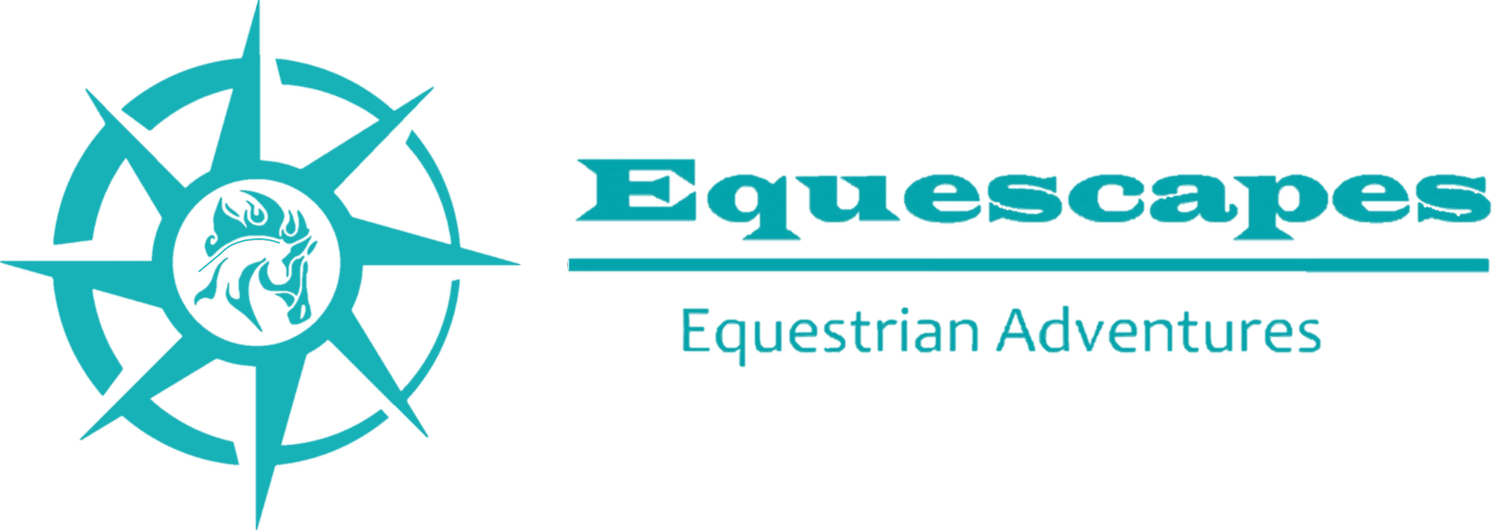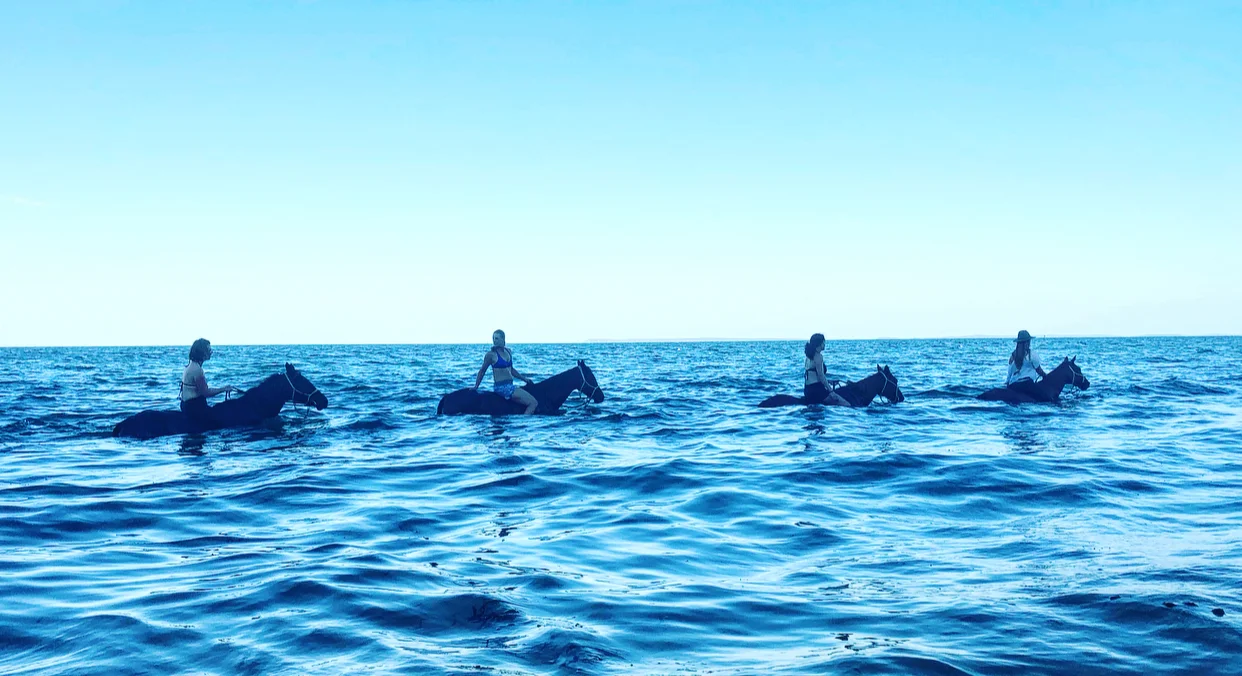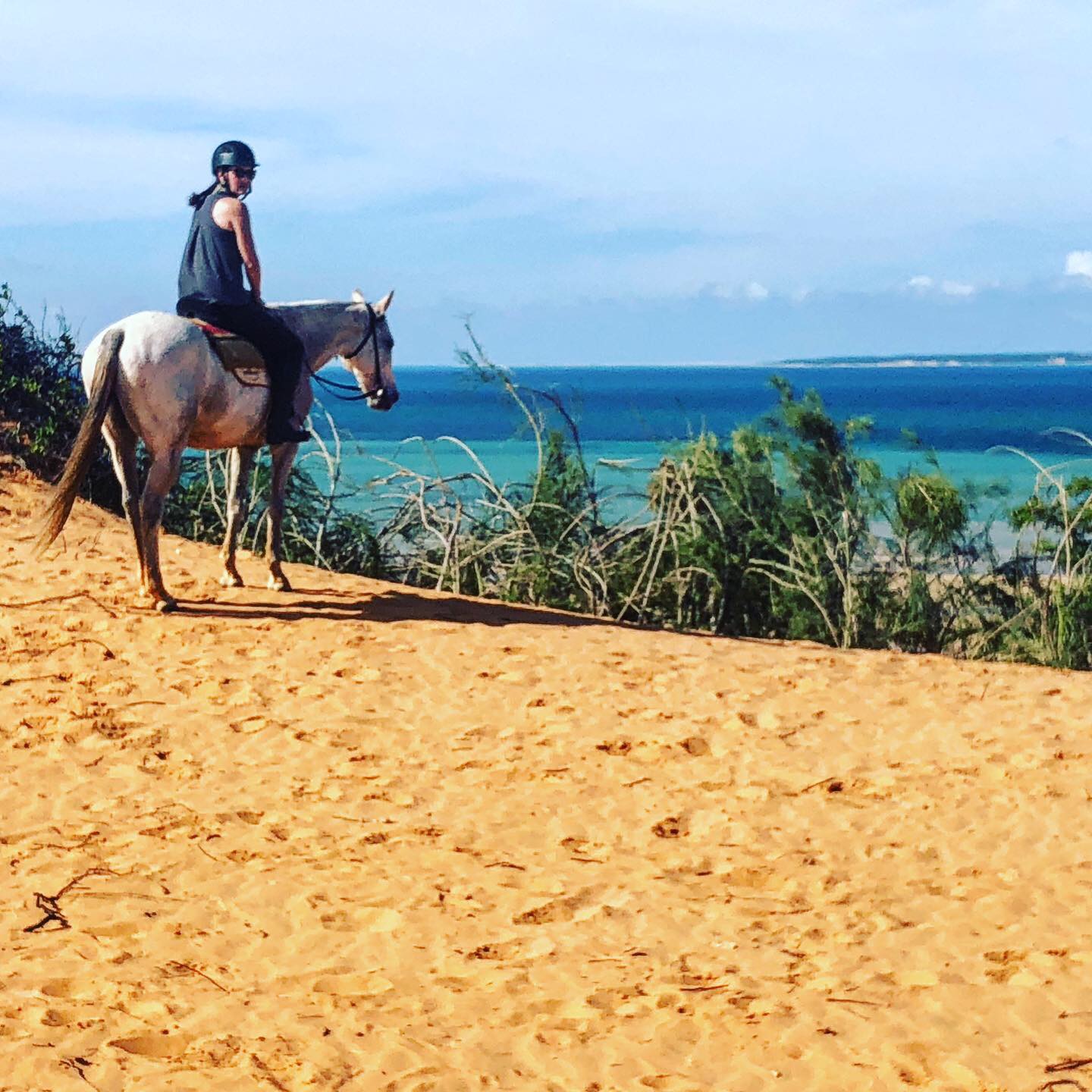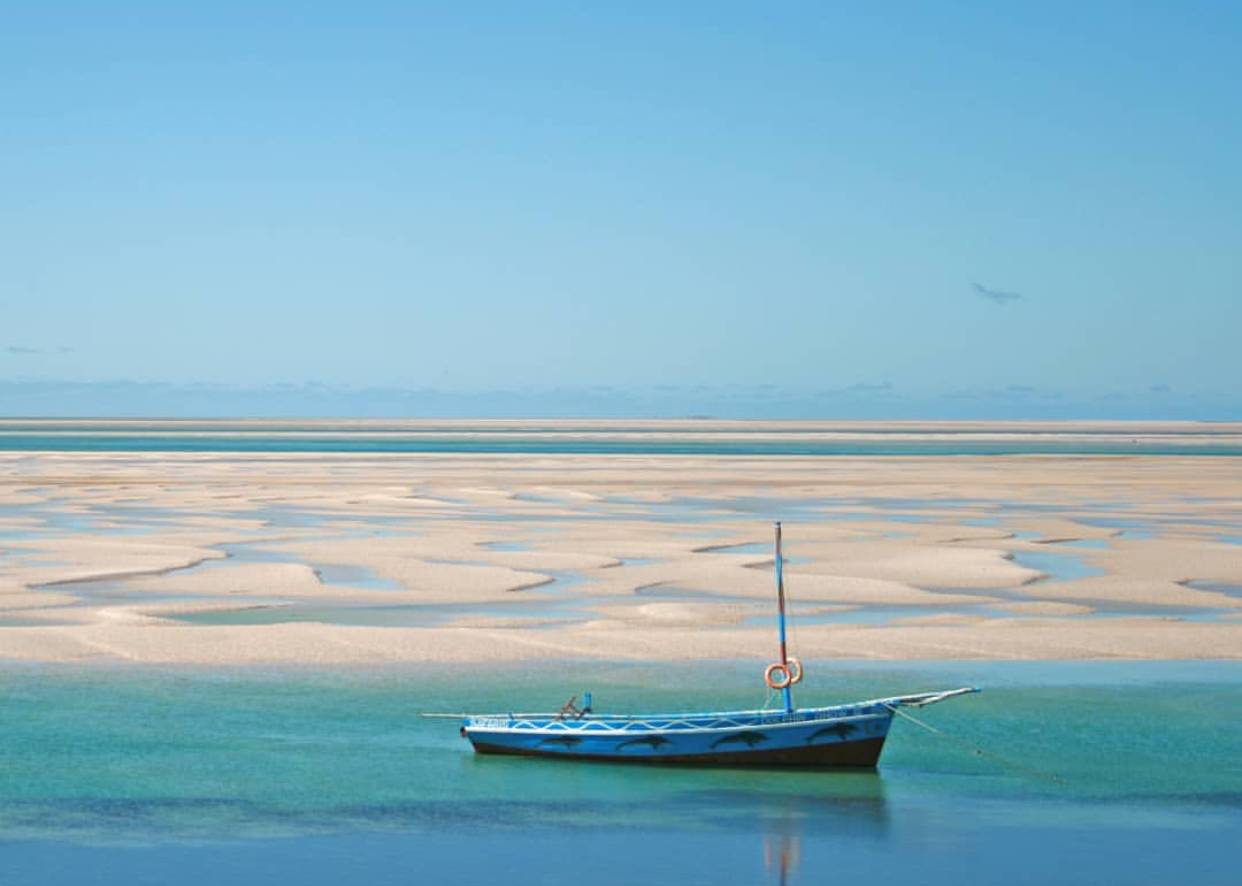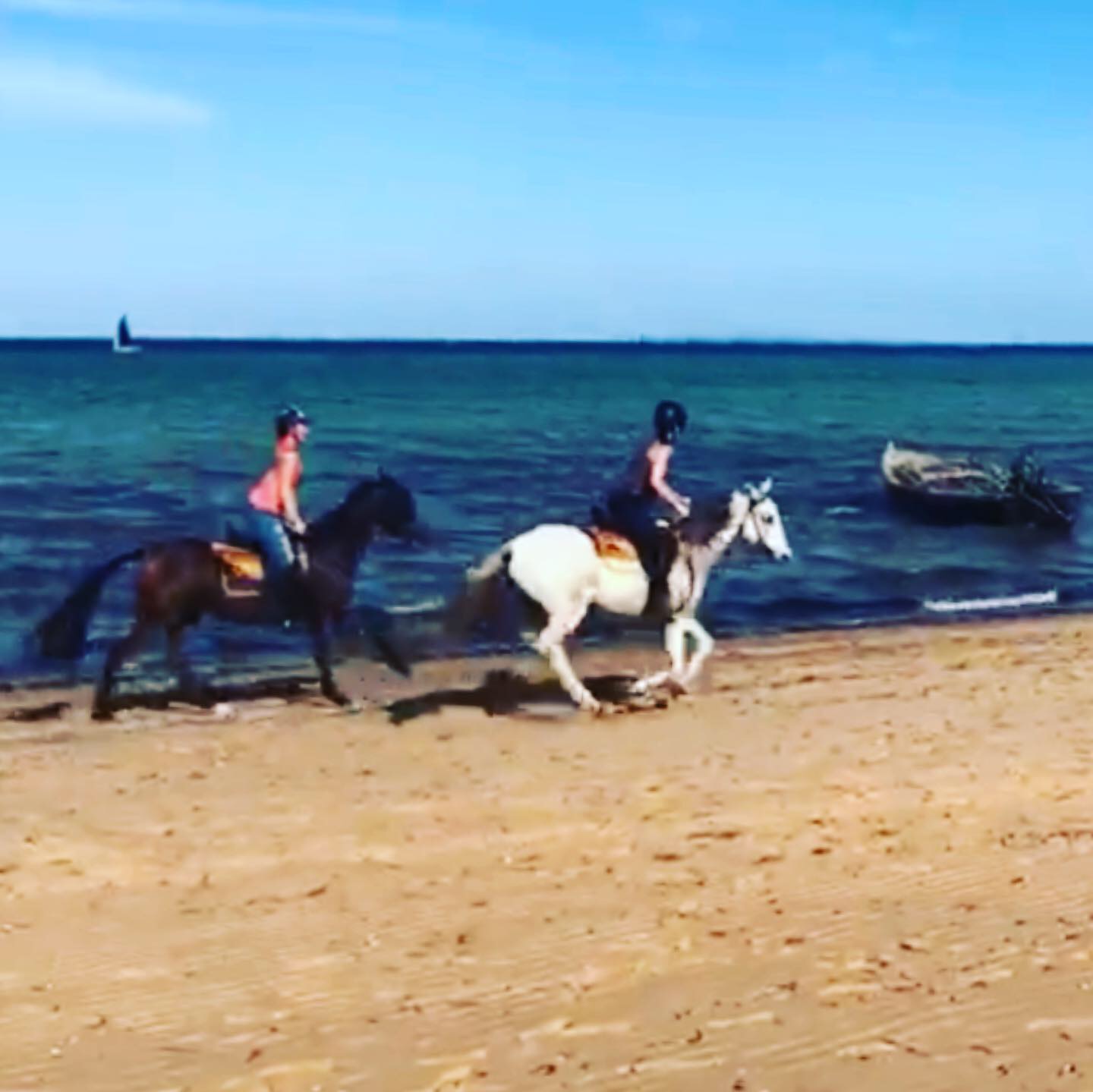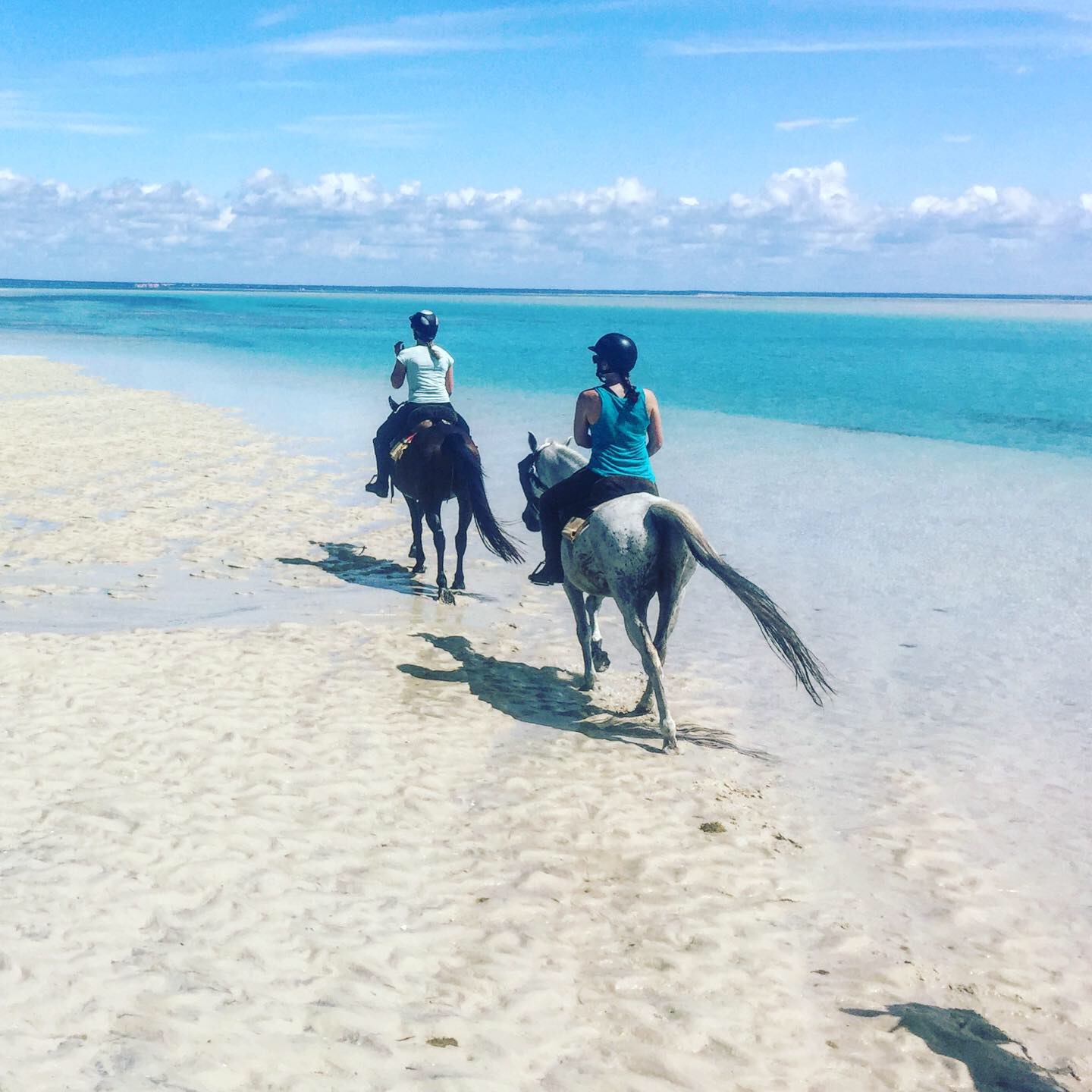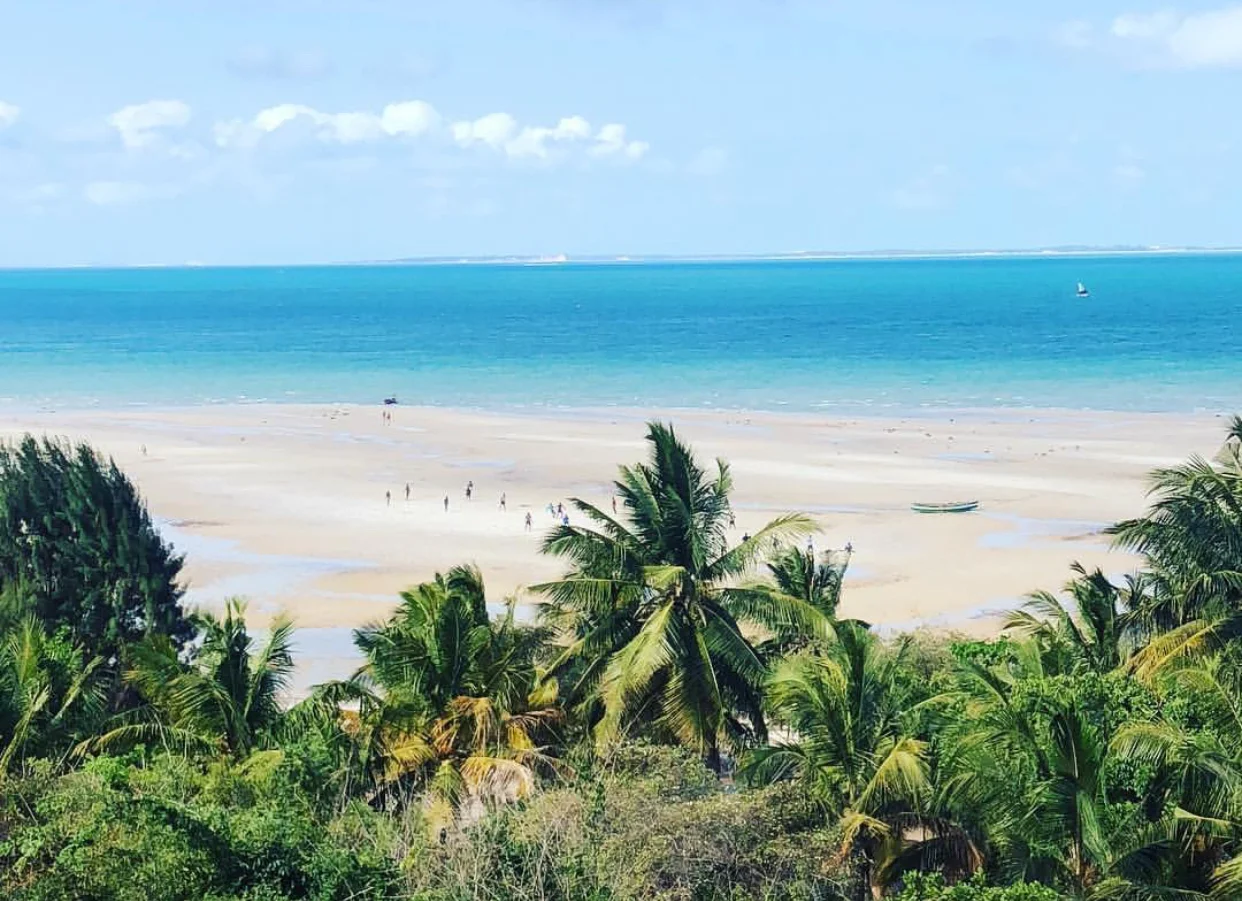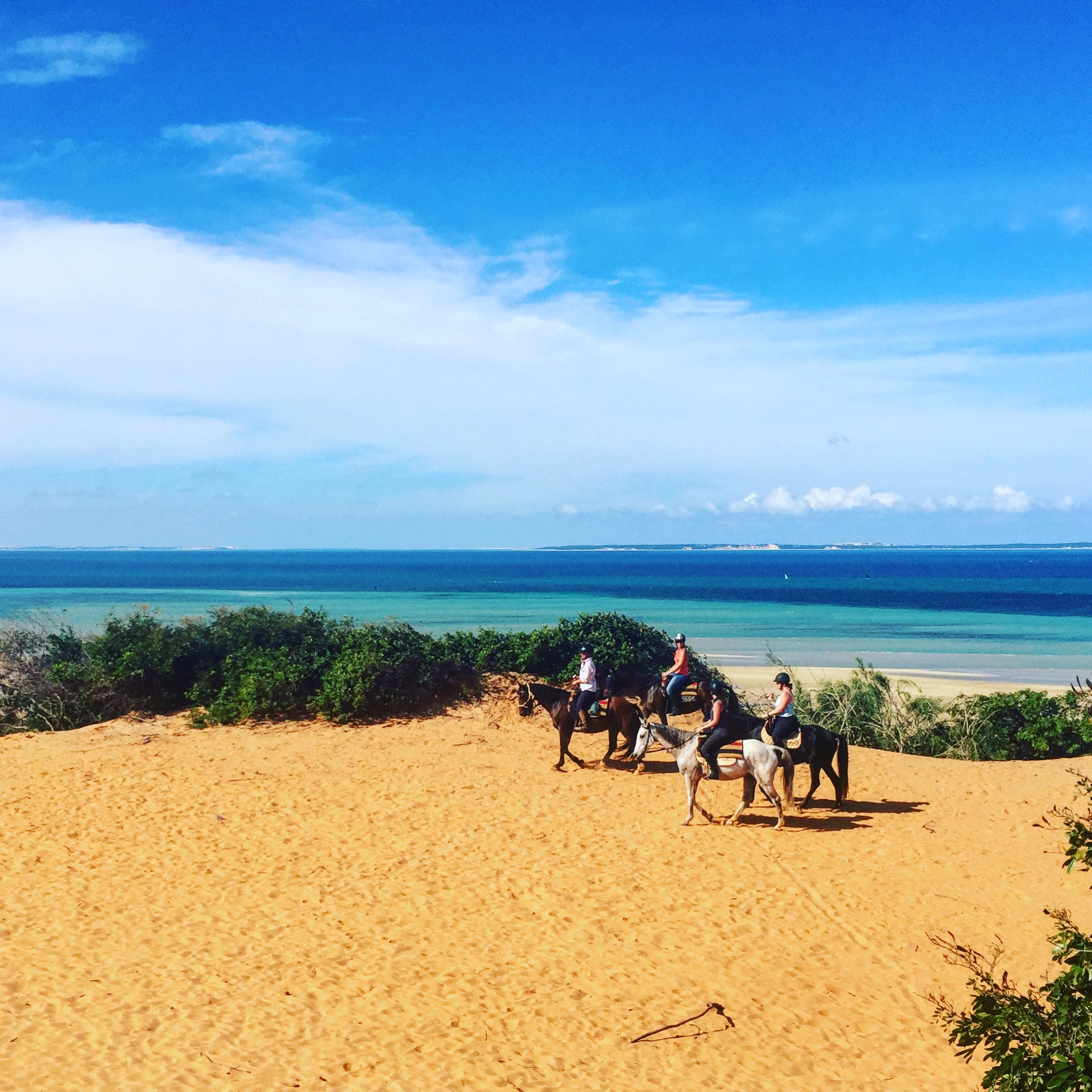Sitting still in the saddle, ankle-deep in the breaking surf, staring into the azure waves almost gives you vertigo. Despite the stillness of the warm air, the silence of the island behind us, and the solidity of the horse beneath me, I lose myself in the gentle movement of the swirling water and feel the strength of the ocean tugging at the depths of my heart.
There isn’t a single part of our trip to Vilankulo, a small tourist town on the coast of Mozambique, which doesn’t take my breath away. Swaying emerald palms border white sand beaches and the bluest water I’ve ever seen. Brightly painted fishing boats bob in the aquamarine waves and tropical islands dot the horizon. Some of the best seafood I’ve ever tasted delights us at every meal, even things I swore I didn’t like but suddenly love. Our hosts are warm, welcoming, and wonderful – Mandy works around the clock to insure perfection in every part of our itinerary, Pat is a wealth of knowledge and stories, and Charlotte is a delightful guide. Best of all are the horses. Each ride is unique, from the pristine beaches to the lush, verdant interior, from the sandy streets of town to the top of the tallest sand dune in Inhambane Privince. The pride Mandy and Pat take in their horses is evident, and the love they have for sharing their passion with others is remarkable. Of course, it takes such a love to endure what they have experienced on the painstaking journey that brought them here.
Almost two decades ago in what was then Rhodesia, Mugabe’s land invasions began to tear apart the peaceful and beautiful country the Retzlaffs called home. They began taking in horses from friends and neighbors who had decided to leave the country. They aren’t the kind of people to say no, especially when it comes to animals. Thinking the violence would be resolved before it reached them, they opened their home and farm to horses in need, until the terror arrived on their doorstep and they were forced to flee the country, smuggling the horses across the border into Mozambique. By that time they had 104 horses, which is the title of the book Mandy later wrote about the experience. But their troubles didn’t end when they arrived in Mozambique. In a country devastated by civil war and a landscape new to horse husbandry, they faced hungry locals, poisonous plants, a harsh climate, and a need for a new livelihood. Now, Mozambique Horse Safaris has been in operation for almost twenty years, thriving in this quaint seaside town that is becoming an increasingly popular tourist destination. They offer not only riding adventures but an equine sanctuary and breeding program.
Our accommodation is a beautiful thatched-roof house right on the beach, with our own chef. The bedrooms are on the second floor with a large verandah overlooking the water, where we sip gin and tonics late into the evening and watch the stars come out. The night sky reflected in the still water gives the impression of an endless sea of stars. The garden houses a large pool with a charming lounge area surrounded by swaying palms, but we don’t bother – the beach is a hop and a skip away and we have it almost to ourselves with the exception of the occasional fisherman, and the water is wonderfully warm.
We spend our first afternoon riding bareback in the shallow, bathwater-warm water at high tide, swimming with the horses among the anchored fishing boats. The horses are clearly accustomed to the water and seem to enjoy it almost as much as we do, pawing and splashing in the turquoise waves.
Thinking the water can’t get any bluer, we are pleasantly surprised when the next day we take a small power boat out to Benguerra Island, a tropical paradise surrounded by cerulean seas under a cloudless sky. As we ride through the center of the island, looking out towards the water we can see the tide rapidly retreating, as it is about to be the new moon and the tides are at their most extreme. We return to the boat to find our two boatmen have taken a nap in the sun and forgotten to move the boat, which is beached where we disembarked, now far from the water’s edge. We sip gin and tonics in the shade and enjoy a lunch of freshly grilled fish while the men manage to roll the boat on logs, with the help of a few locals, pushing until it finally reaches the water, where we climb aboard once more to spend the afternoon snorkeling along a shallow reef. Even the brightest fish and the most colorful coral still pale in comparison to the blue of the Indian Ocean.
Several days of riding give us an insight into life in Vilankulo. Families gather on the beach to pull in massive fishing nets together. Women cut hay by hand, bringing it from far away into town in bundles balanced on their heads. We ride through sandy streets, as most of the town is unpaved, past simple but clean houses and gardens full of smiling children, who watch wide-eyed as we ride past. Always taking videos, I take out my phone to capture their smiling faces, and laugh when one of them takes out his smart phone to take a video of us. One day a group of three little boys follow us for hours, falling behind when we go for a canter and catching up when we stop for Pat to tell us about the local plant life. Several women appear fearful of the horses, and Pat explains that before they came here, the locals had never seen horses. It has taken many years and a lot of patience to teach the locals that horses not only aren’t dangerous, but also aren’t edible. Nevertheless, some folks are still fearful, but most appear curious. Despite their hesitations about the horses, the people we pass are smiling and friendly. Smiles are returned, children wave at us, and when I greet them in their own Portuguese they always reply excitedly.
The Red Dune, the largest sand dune in the province, towers over the surrounding beaches on the far side of town. It’s a long, hot ride, but worth it – the summit offers a striking view, with contrasting orange sand and blue seas, the white beach in between, and the emerald green behind us. Returning from our ride, we eat an impossibly large seafood lunch in an upstairs verandah of a restaurant overlooking the beach, drinking fresh coconut water and eating grilled fish, succulent shrimp, lobster, curry, samosas, fresh fruit, and of course, more gin and tonics.
Sunset finds us at on the banks of a marshy river where canoes await. Though our guides are ready to paddle for us, my guest and I want to do our own paddling. She was actually a champion white-water rafter at one time, and I’ve done a bit of kayaking myself. Walls of reeds surround the channel, which is strewn with lily pads in full bloom. We spot a dwarf crocodile, about 18” long, floating eerily still at the surface, and though we don’t see many birds, we sure hear them. The sky is an orchestra of calls and whistles, a cacophony of cries and songs. As the sun sets, we sit still, sipping – you guessed it – more gin, listening as the sound is amplified in the dark and fireflies begin to appear. At first there is one here, one there, and then before we know it, they’re everywhere, and the clear sky is alight with stars. Thousands of fireflies in motion against the backdrop of the Milky Way give the impression of flying through space, but for the constant calls of the birds, the whisper of the dark reeds around us and the gentle waves against the canoes as we paddle. We sit silent, eyes and mouths wide open in wonderment of the magic surrounding us.
We bid goodbye to Mandy, Pat, and Charlotte as if we’ve known one another for years, rather than just a few days. Hugs are given, email addresses are exchanged, and promises to return again are made. The joy and warmth that they exude is a testament to the resilience of the human spirit. To be the people they are, having endured what they have been through, is truly an inspiration, and the experience they have created for equestrian travelers here in Mozambique is a wonderful gift for all who have the privilege to meet them.
